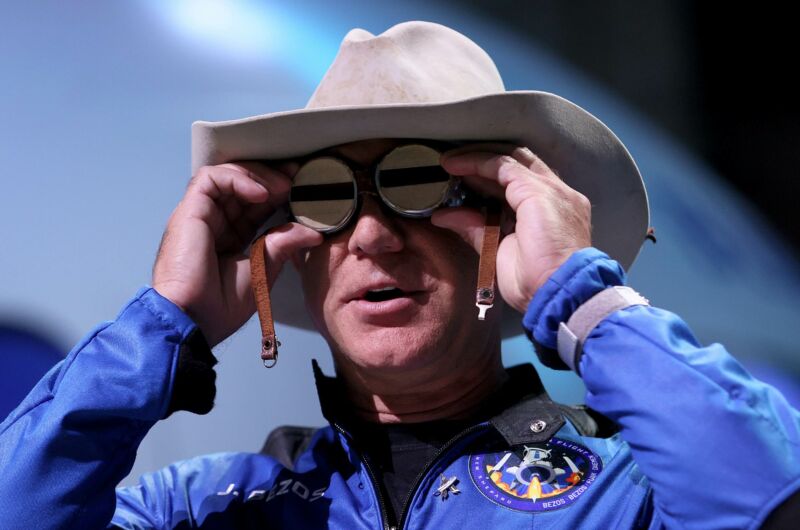
Joe Raedle/Getty Images
Amazon founder Jeff Bezos gives very few interviews, but he recently sat down with the computer scientist and podcaster Lex Fridman for a two-hour interview about Amazon, Blue Origin, his business practices, and more.
The discussion meanders somewhat, but there are some interesting tidbits about spaceflight, especially when the conversation turns to Blue Origin. This is the space company Bezos founded more than 23 years ago. He has invested an extraordinary amount of money into Blue Origin—likely somewhere between $10 billion and $20 billion—and it truly is a passion project.
But the inescapable truth about Blue Origin is that to date, it has been a disappointment in terms of execution. At present, Blue Origin employs approximately 11,000 people, about the same total as SpaceX. However, Blue Origin has launched zero rockets this year, whereas SpaceX has launched nearly 100, as well as building and launching thousands of satellites.
During the interview, Bezos candidly acknowledged this. “Blue Origin needs to be much faster, and it’s one of the reasons that I left my role as the CEO of Amazon a couple of years ago,” he said. “I wanted to come in, and Blue Origin needs me right now. Adding some energy, some sense of urgency. We need to advance much faster. And we’re going to.”
Becoming a decisive company
How is Blue Origin going to speed up?
“We’re going to become the world’s most decisive company across any industry,” he said. “We’re going to get really good at taking appropriate technology risks, making those decisions quickly. You know, being bold on those things. And having the right culture that supports that. You need people to be ambitious, technically ambitious. If there are five ways to do something, we’ll investigate them, but let’s go through them very quickly and make a decision. We can always change our mind.”
When discussing Blue Origin, it’s almost impossible not to differentiate the company to SpaceX, which also has a prominent billionaire founder, Elon Musk. Bezos’ comments about being decisive are striking because that is one of the secrets to SpaceX’s success. During technical meetings, Musk will make a decision and accept the responsibility for that decision when it comes to key questions. Then, without hesitation, the company moves down that path until it finds success or realizes it has followed the wrong path and course-corrects.
The key is to make a decision, try something, and advance on. Decisiveness is the antithesis of how many corporations make decisions, with multiple layers of middle management, or government agencies and their endless committees and meetings.
Bezos recently got rid of Bob Smith, who had served as Blue Origin’s CEO for half a decade. Smith’s tenure was marked by tentativeness. Now that Bezos has hired Dave Limp, a former Amazon executive to run Blue Origin, this advance toward decisiveness could help Blue Origin advance faster.
The company may finally be on the cusp of tangible results. During the interview, Bezos said he was optimistic about finally reaching orbit. The company’s large New Glenn rocket is nearing readiness, and Bezos did not seek to dampen expectations. “I’m very optimistic that the first launch of new Glenn will be in 2024,” he said. This echoes comments Ars reported on from another Blue Origin official, Lars Hoffman, earlier this week.
What does he think about Musk?
Bezos said a lot of the company’s focus has been not just on getting the first New Glenn rocket ready at Blue Origin’s factory in Florida but on building up the capacity to fly two dozen a year. “Rate manufacturing is at least as difficult as designing the vehicle in the first place,” he said.
This includes building two dozen upper stages—each of which is powered by two BE-3U engines—a year because second-stage reuse is not in the company’s immediate plans.
“We’re going to work on manufacturing that second stage to make it as inexpensive as possible,” Bezos said. “There are two paths for a second stage: make it reusable or work really hard to make it inexpensive so you can afford to expend it. And that trade is actually not obvious which one is better.” In his remarks, Bezos did not reference the company’s experiments with an experimental reusable upper stage called Project Jarvis.
Bezos also took the high road when asked about Musk, who has puerilely suggested before that Bezos “couldn’t get it up” because Blue Origin lacked an orbital rocket.
“Well, I don’t really know Elon very well,” Bezos said. “I know his public persona. But I also know you can’t know anyone by their public persona. It’s impossible. I mean, you may think you do, but I assure you don’t. In terms of judging him by the results, he must be a very capable leader. There’s no way you could have Tesla and SpaceX without being a capable leader. It’s impossible.”

